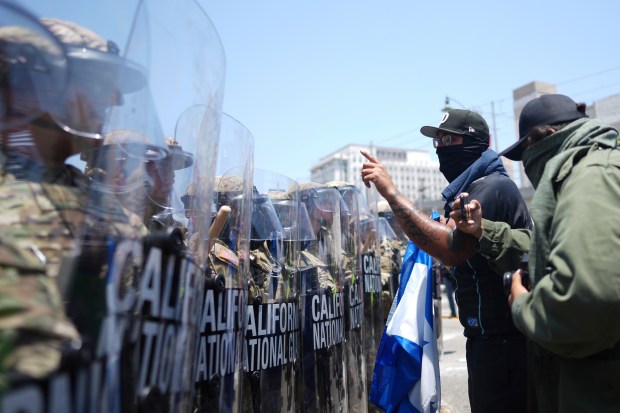The Chicago Teachers Union’s team of 65 educators voted in favor of a proposed settlement Monday evening that wrapped up close to a year of negotiations with the school district.
Tuesday morning, CTU celebrated its hard-fought gains for students and educators.
“This city can do a lot when it is clearly connected to the community,” said CTU President Stacy Davis Gates. “It isn’t just math and reading. It is also art. It is also band and orchestra. It is also flag football. It is also cheerleading. It is also soccer and basketball.”
Notably, the third-largest teachers union in the nation wrapped up bargaining for the first time in 15 years without a strike vote or strike. A vote from the 730-member House of Delegates on Wednesday is the next step in ratification. A full 30,000 membership vote and approval from the Chicago Board of Education will seal the deal.
CPS Chief Executive Officer Pedro Martinez said to a room of reporters several hours after it was approved that this year’s process was a “different approach” and even “collaborative.” Considering the amount of hours of discussion both sides put into reaching a deal and the political drama that led up to its final days, any insinuation of harmony might seem to onlookers like April Fools.
“Regardless of what some of the narratives were out there, there’s never been a moment where my team didn’t act in good faith,” Martinez said. “Did we get sometimes frustrated about misinformation that was shared? Yes, we did, because we’re human, and there was a lot going on.”
Still, the CEO, who is leaving his position in June after Mayor Brandon Johnson, a former CTU organizer, led an effort to fire him for not taking out a loan, spoke Monday night about the hard work that his staff put into the new teachers contract — under extremely financially extenuating circumstances.
Martinez said the proposed contract will cost about $1.5 billion over four years, and that 80% of those costs were for raises to account for cost-of-living: 4% in the first year and 4-5% in years two through four. The union’s original slate of proposals, according to Martinez, would have resulted in a $10 billion contract.
The schools chief called the final proposals “sustainable” but acknowledged the district’s looming “structural deficit” of hundreds of millions that he said will require more substantial conversations with the city and state.
Ultimately, the agreement is a boon for union President Davis Gates and Vice President Jackson Potter, who are up for re-election in May. Due to changes in state law, negotiations focused more on non-economic issues that would affect kids’ experiences than in years past, union members said.
The resulting contract gives veteran teachers pay increases; shifts policies around teacher planning time and evaluations; adds more teachers assistants, librarians, nurses and bilingual-endorsed educators and lowers class sizes.
Final sticking points: veteran pay increases, planning time, evaluations
CTU’s slate of 700 asks from mid-April was whittled to just three sticking points last week.
In response to lasting disagreements about raises for veteran teachers, the district agreed to put $30 million toward pay increases for its longest-serving staff, phased in over four years.
(The average salary of a CPS employee under the proposals is forecasted to be over $110,000 by the contract’s end).
Bogdana Chkoumbova, CPS’ chief education officer, acknowledged they’d spent weeks debating preparatory time in the elementary school day, and landed on 70 minutes — up from an hour. The district’s hold up was that CPS “really did not want to continue to expand planning time (at) the expense of student time,” Chkoumbova said.
The extra 10 minutes could go toward meeting the state’s requirement for 30-minute recess, Chkoumbova said, but it will be different for every school. The agreement also shifts three days for principal-directed professional development days to teachers, who can use that time for prep.
Teachers evaluations, one of the last holdups in negotiations, will be adjusted to a three-year cycle for tenured teachers who have been with the district for over 19 years. Additional training, mentoring and professional development resources will be adjusted for teachers in high-need schools, according to CPS.
Teachers assistants, librarians, nurses and bilingual education supports
CPS said it has maintained over 7,000 teachers since 2019, and will commit to approximately 800 to 900 employees over the next four years. Felton said he believes that the staffing allocations would not put the district into “further financial distress.” He stressed that the staffing additions will be intentional.
“We think that they’re going to the right schools to serve the right kids,” Felton said.
The contract includes compensation for 30 additional bilingual teachers assistants in order to meet the needs of English Language Learners, a population that increased by 11% at the start of the 2024-25 school year from the previous year, reaching over 88,000 students — more than 25% of the total student population.
That increase was mostly caused by the thousands of migrant children enrolled in the school district since 2022, when the first of over 50,000 asylum seekers arrived in Chicago from Texas, under the direction of Gov. Greg Abbott. Many of them settled on the South and West Sides where there wasn’t the language support they needed.
The contract has cemented proposals in its new contract for newcomer or immigrant students through a standing bilingual education committee. The bargaining team agreed to proposals for 24 fine arts teachers, 68 technology coordinators and 90 librarians added over three years.
Class sizes and safe spaces
The finalized proposals dedicate $40 million to address class size limits, more than ever before.
Kindergarten class limits will go down from 32 to 25. First through third graders will have a limit of 28 students and fourth through eighth a limit of 30. Oversized classrooms (above 23) will be required to add a teaching assistant.
Other substantive proposals include $10 million in transportation, equipment and uniforms for sports. The contract will create LGBTQ+ safe spaces in schools, promising to put free hygiene products in all bathrooms and prohibiting discriminatory practices based on gender identity.
It also includes academic freedom protections, giving union members the right to choose to supplement school curriculum with lessons, units and learning activities according to their professional judgment.




